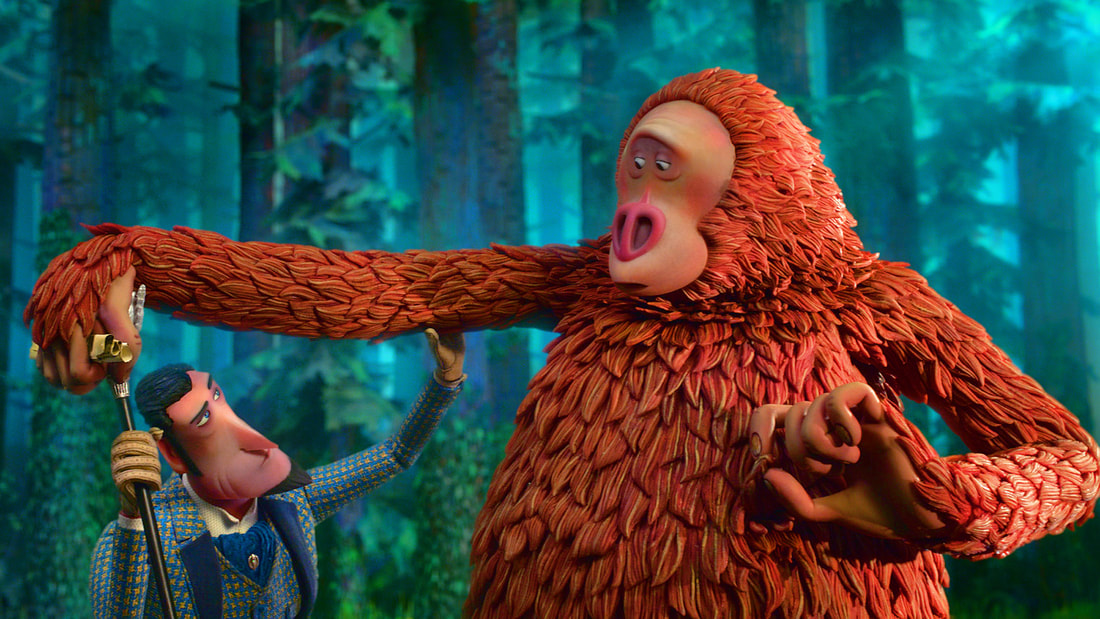
Spoiler Alert for Missing Link
If there ever was a movie made just for my younger self, it would be Missing Link (Chris Butler, 2019). The adventure genre and monsters like the Loch Ness Monster and the bigfoot have been some of my favorite topics since childhood, so when I saw Missing Link for the first time, I felt like a child again. Perhaps the biggest reason I felt a child-like glee watching this movie was because of its relatable themes. This movie is not only about the search for a mythical lost city in the Himalayas, but it is about the search for belonging. This desire is something that all of the characters share, and is a feeling so deeply human that any audience can relate with it.
Laika Studios, who produced Kubo and the Two Strings (Travis Knight, 2016), and Coraline (Henry Selick, 2009) are famous for their stop motion children’s movies. Their latest adventure film follows Sir Lionel Frost (Hugh Jackman), a daring yet self-centered monster hunter and explorer as he teams up with Mr. Link (Zach Galifianakis) a lone bigfoot. The duo attempt to discover Shangri-La, a mythical ancient city and home of Link’s relatives, the yeti. The film contains many of the tropes of the typical adventure movie; chases and fights, exotic locations, legends and myths, and a villain who wants nothing more than to stop the adventurers.
The film begins with Frost and his current assistant, Mr. Lint (David Williams), as the hunt the elusive Loch Ness Monster. In this scene, we are introduced to Frost as a character. He acts in his own self interest, even when his partner is in danger. He is more interested in getting a good photo of the beast than in saving his assistant, as becomes evident when his camera is destroyed and he becomes angry, though he keeps his cool when the monster has his assistant in its jaws.
In the next scene we find Frost attempting to join an adventurer’s club. The club is full of pretentious, upper class hunters, and is led by the worst of them all, Lord Piggot Dunceby (Stephen Fry). The club does not accept Frost into their ranks because he is a “monster hunter.” They are real adventurers, and the very notion of Frost’s latest adventure is beneath them. What is important about this moment is that we see how Frost desperately wants to join their ranks, despite the fact that they see him as a disgrace to their profession.
They eventually find themselves inside the yeti’s home at Shangri-La. Along the way they acquire another companion, Adelina, who has a troubled history with Frost. The leader of the yeti family tells them, “There is no place for you among us.” The yetis see Link as their distant cousin, a redneck compared to their elegance.. After escaping from the yeti prison and confronting his selfishness, Frost comes face to face with Piggot Dunceby, who has followed them all the way to the entrance of Shangri-La, a bridge of ice crossing a deep canyon. Frost tells Dunceby that he has “evolved” beyond his selfish interest and is more concerned about remaining friends with Link and Adelina. Dunceby cannot believe this. “Of course you want to be one of us. We are great men! We shape the world!” Frost responds by explaining that the world shapes us, not the other way around. There is a harrowing scene where the bridge collapses and through teamwork, our heroes survive. The film ends with Frost taking on Link as his new assistant, the two of them fulfilling their need for belonging with each other.
The theme of this movie is finding a home, or a place where you belong. Both of the main characters primary motivations are to get acceptance from a specific group of people. Dunceby and the yetis represent elitism and exclusivity. One could even read further into Dunceby’s character and say that he is a representation of certain political and social ideas in the modern world. He chastises Frost for being hand-in-hand with women and apes, and stresses how great men are. These talking points may fly over the heads of children, but to a more mature audience, they can give the story a completely different meaning. Modern politics is seen as extremely divisive and polarizing. This film seems to suggest that keeping yourself apart from people who think, look, or act differently from you is wrong. It praises the diversity between Frost, Link, and Adelina, while showing how wrong Dunceby is by excluding them.
Karyn Hall writes in an article in Psychology Today that, “a sense of belonging is a human need” and that “Some seek belonging through excluding others. That reflects the idea that there must be those who don't belong in order for there to be those who do.” Dunceby is a great example of seeking belonging through exclusion. He does not want to let Frost join because he wants to belong to a group of great men, and he does not see Frost that way. Letting Frost in would negate his sense of belonging to an elite group. At the end of the film he is upset when Frost no longer wants to join the group. This is because Frost deciding to not join the group makes it seem like a less desirable and special position to be in. This film tackles some pretty deep issues, both political and universal. The sense of belonging is something all people desire, and teaching kids that belonging can be found anywhere is a good message. These wonderful themes are wrapped in a fun, adventurous, stop-motion animation that is sure to leave you entertained and enlightened.
Work Cited
Hall, Karyn. “Create a Sense of Belonging.” Psychology Today, Sussex Publishers, 4 Mar. 2014, https://www.psychologytoday.com/us/blog/pieces-mind/201403/create-sense-belonging.

 RSS Feed
RSS Feed
